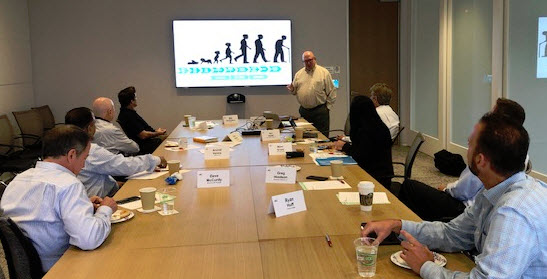
Upcoming Meeting
Thursday, May 2, 2024
Discussion Topic:
Making Meetings Meaningful: Why? How?
A 2023 Gallup survey revealed that “US employees are less satisfied with their jobs and less likely to feel that someone at work cares about them than four years ago.”
Conversely, “Teams with simple rituals, like carving out time for coffee with colleagues once a week or kicking off team meetings by sharing weekend plans, before jumping into work talk, report finding more meaning in their work.”
So reports Harvard Business School Professor Michael Norton, who also believes that “rituals are powerful: We use them to change our emotional states in many different ways… to calm ourselves down, to amp ourselves up, and to connect with others.”
Professor Norton is also the author of The Ritual Effect: From Habit to Ritual, Harness the Surprising Power of Everyday Actions, published by Scribner, on April 9.
“Love them or hate them, team-building rituals can fortify bonds among coworkers and create the shared sense that work is more meaningful. For example, “Performing a group bonding activity… led to a 16 percent increase in how meaningful employees judged their work to be.”
After a brief presentation,which delves more deeply into company meeting practices and the power of rituals on them, we’ll discuss:
- What was most useful in today’s presentation, if anything?
- What are your key issues regarding your meetings for direct reports & for your entire business, group, or division?
- What, if anything, have you done to make your meetings more meaningful and effective?
- How has this worked out for you?
As always, we’ll look to hear and discuss “What’s Keeping You Up Nights?,” and we’ll also serve as Strategic Advisory Board Members to Greg Hindson, as he makes his Featured Member Presentation.
Greg Hindson is CEO of Nortridge Software LLC, a leading software provider for loan-servicing companies. Greg has been with Nortridge since 1991 and has served as CEO since 2007. Nortridge Software provides lenders and loan servicers with the automation needed to more profitably originate, service, collect, and report on loan portfolios. Since 1981, Nortridge has leveraged its experience in banking, lending, and software development to provide clients with quality software solutions and excellent support services. Today, the Nortridge Loan System is valued by loan servicing companies representing a wide range of industries and loan portfolio sizes. Nortridge’s partners include ACI, Doxim, Merchant Partners, MicroBilt, Oracle, Payix, Repay, Solutions by Text, and Van Wagenen Financial Services. Greg has been a C++ developer and designer for almost 40 years.

UPCOMING MEETING DATES
2024: JAN 4 FEB 1 MAR 7 APR 4 MAY 2 JUN 6 JUL tba AUG 1 SEP 5 OCT 3 NOV 7 DEC 5
This Table meets on the 1st Thursday of each month.
Monthly meetings are held via Zoom with occasional In-Person sessions.
Past Discussion Topics
What's Working With Remote Work?
Negotiating - To Grow Your Company
No Code, RPA, & AI - Where Are You Using These?
Back To Work: How?
Best Ways to Deal with Our New Realities
COVID-19: What’s Best for Your Company Now?
Strategic Partnering to Accelerate Growth
What's Worked for You? How? & Why?
Strategic Partnering to Accelerate Growth
What's Worked for You? How? & Why?
Trends to Ride & to Deflect- Over the Next Two Years
Gaining Competitive Advantage With Analytics, How?



